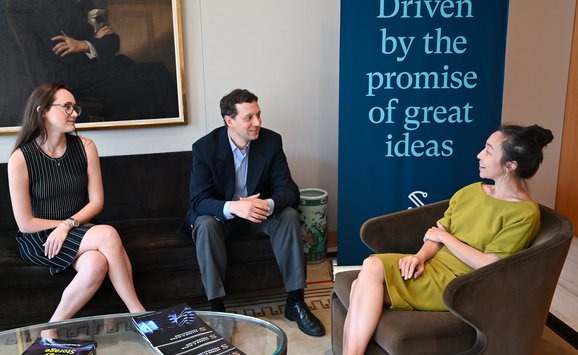In RFF’s Supporter Spotlight, we hear directly from donors about their commitment to issues in climate, energy, and the environment; how they make a difference; and why they support Resources for the Future—all in their own words.
Resources magazine spoke with Dick Schmalensee, a longtime friend of RFF and chair emeritus of RFF’s Board of Directors. Schmalensee has been a member of the Council of Economic Advisers, dean of the Sloan School of Management at the Massachusetts Institute of Technology (MIT), and a consultant to private companies—all of which helps him provide unique insights into building a healthy environment and thriving economy. Below are excerpts from the conversation.
Resources magazine: How did you become interested in the role of economic research and analysis in addressing environmental issues?
Dick Schmalensee: I was a summer intern at the Council of Economic Advisers in 1967, and I had a terrific boss, Jack Carlson, who worked on environmental issues at the time. He gave me a manuscript from Resources for the Future (RFF) about water pollution. I read it and thought, “You can really do economics there. I’m an economist; I should have thought of this on my own—applying economics to the problems of the environment.” That’s what got me hooked and interested in RFF at the same time.
What brought you to RFF as a board member?
I think Larry Linden, whom I’d known at MIT, approached me about being on the board. I’d read work from a variety of RFF researchers, but I didn’t know much about the organization. I thought it was pretty academic—people writing papers on interesting stuff without the obligation to teach. Larry got me interested, and I joined the board.
RFF has since moved to a more valuable model of focusing on active engagement. It’s no longer just a really interesting think tank with a lot of smart people; it’s a place that has an impact on policy.
What do you think has been RFF’s greatest impact in the time you’ve been involved?
RFF has been an active proponent of the widespread use of cap-and-trade or tax systems to combat pollution. The organization played an important role in taking that idea from a fringe economics notion to something that’s now mainstream. RFF spread the idea that, with good policy design, one could manage the environment without crippling the economy, which has gone a long way toward changing the prevailing mindset. That was a big deal—spreading the fundamental notion that managing the environment is an economic problem, and incentives can help mitigate pollution effectively and efficiently.
You’ve worked on environmental and energy issues in many different professional roles. How would you describe the value of RFF within the broader research and policy landscape?
In government, you’re always solving today’s problem. Fundamentally, the horizon is too short for serious analysis. For academics, the horizon is generally too long to affect policy. RFF is uniquely positioned to have the right time horizon.
As a consultant, your job is to do the best you can for your client. That’s not the same as knuckling down in pursuit of truth. Think tanks can be in the position of being neutral and above the fray, yet still engaged in the policy process. What makes RFF stand out from other think tanks is the concentration of expertise: RFF has experience, a track record, and smart people who are committed to moving the policy needle. RFF can take on problems neutrally, at scale, and with impact.
Where do you see that RFF’s work will be needed most, moving forward?
In the 1960s, environmental issues had to do with DDT and its impact on bird life, particulates in the air, lead, and so forth. The environment was something to be concerned about, but it wasn’t an existential issue. Climate change is. It’s so much more important than any other environmental issue that has arisen in my lifetime, and dealing with it efficiently is critical for the health of the economy.
Just look at the numbers for the amount that has to be invested in the energy transition—it’s breathtaking. Somebody has to say, “Let’s do this cost-effectively.” We have all these other priorities to deal with: healthcare, education, poverty. We cannot afford to waste money on the transition, because the money involved is so big. I think RFF is positioned ideally to inform critical debates in this area.

Four Ways You Can Support RFF
- Give through our website: Visit www.rff.org/donate to make a one-time donation, or to set up a monthly recurring donation.
- Give through the mail: Send your check to Resources for the Future | 1616 P Street NW, Suite 600 | Washington, DC 2003
- Give through a donor-advised fund: Donate through a DAF account at a community foundation or financial institution to support RFF while receiving favorable tax benefits.
- Give through a will, trust, or gift plan: Include RFF in your estate plans to provide meaningful, long-lasting support.
Discover other ways to give at www.rff.org/donate/ways-giving or contact Tommy Wrenn at [email protected]






